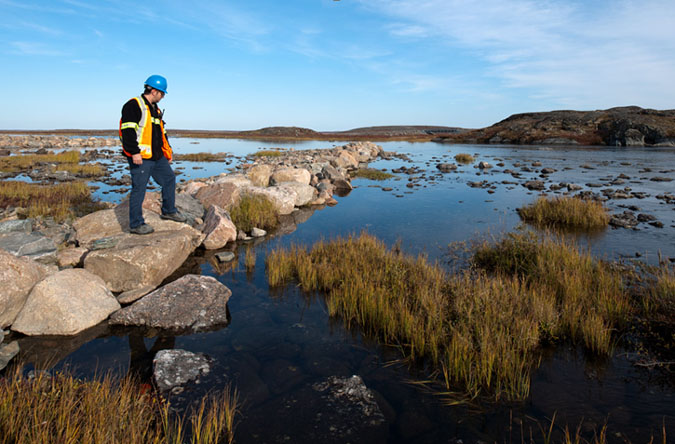|
|

|
  
Top Stories
Update 2019/5/20
Mines
brought to you in part by

NEW WATER STEWARDSHIP PROTOCOL TO BRING ENHANCED ENVIRONMENTAL STANDARDS TO CANADA'S MINING SECTOR
By Suzanne Forcese
Tailings are the materials left over after the process of separating the valuable fraction from the uneconomic fraction of an ore. Toxic chemicals such as cyanide remain in the tailings and can leach into the ground water, contaminating rivers, streams, lakes and oceans, killing fish and wildlife and rendering drinking water unpotable for communities.
The Mount Polley open pit copper and gold mine disaster in the Cariboo region of British Columbia began August 4, 2014 with the partial breach of the tailings pond dam, releasing 10 million cubic metres of water and 4.5 million cubic metres of slurry into Polley Lake. The slurry of tailings and process water carried felled trees, mud and debris, scoured the banks of Hazeltine Creek turning it into a wasteland. Four days later the 1.5 square mile tailings pond was empty and the toxic slurry had poured into the once Quesnel Lake.
The spill was called one of the biggest environmental disasters in modern Canadian history. Likely, British Columbia, was one of the communities living with a state of emergency affecting drinking water and the fishing industry.
The extent of the damage is predicted to remain unknown for decades as toxicants slowly accumulate in the environment. Iron, manganese, arsenic, silver, selenium and vanadium were found in the sediment.
"We have to do better," Water Today was told by Ben Chalmers, the Senior Vice President of The Mining Association of Canada (MAC).
The International Council on Mining & Metals (ICMM) has stated:
Water is a shared and finite resource, with high social, cultural, environmental and economic value. It is a basic human right and fundamental ecosystem requirement. Water is also an essential component of all mining and metals operations. However, global water resources are under increasing pressure and it is widely recognised that a holistic approach to water management is required to achieve resource sustainability and secure future access for all water users.
In accord with that statement and as a world leader in the mining industry's best sustainable practices, The Mining Association of Canada (MAC) continues to raise the bar with The Water Stewardship Protocol, as part of its Towards Sustainable Mining® (TSM).
This standard will be "the catalyst for continuous improvement in mining practices on a global level," Chalmers told WT. The development of water stewardship practices will go beyond legal compliance. "With increased rigor and evolving standards we hope to bring our membership together to define what good practice looks like."
Membership in MAC is a voluntary decision for mining companies. However, "we are aware of instances where communities have insisted on TSM participation, including Agnico Eagle's Meadowbank mine, which was required to receive TSM scores as part of its water licence. That prompted the company to join MAC," Chalmers added. Agnico Eagle's 2018 sustainable development report states "all six Agnico Eagle sites that undertook a TSM external audit were honoured with a Level A or better." External audits are performed every three years as a condition of membership in MAC.

At Agnico Eagle Mines, planning and monitoring are key to make sure that water is being appropriately managed. Establishing water balance models early in the mine planning stage and continuing to monitor through the life of the mine to ensure standards are met and adjustments are made. Photo Courtesy of Agnico Eagle Mines
"MAC's TSM Excellence Awards represent the best of the best when it comes to showcasing the innovative work by Canadian mining on innovation in environmental stewardship and community engagement," said Chalmers.
Teck Mining, another MAC award winner, has demonstrated innovation at work with new blasting practices to protect water quality in BC's Elk Valley region. One source of nitrates is from explosives that interact with water during blasting. When this occurs nitrates can leach out of blast holes and enter the environment. To stop this from occurring a new process is being implemented that will contain a liner that protects both the explosive product and the environment significantly reducing nitrate at source. Teck is also using naturally-occurring biological processes to treat mine-affected water in rock piles, removing selenium and nitrate at greater volumes at minimal cost.
These are just a few of the examples demonstrating the initiative that TSM inspires.
Participation in the TSM program is mandatory for all members of MAC for their Canadian operations. It gives companies the tools to manage risks, measure results and foster progress in three key areas: working with communities in providing safety and health; working in environments by minimizing environmental impact; and reducing greenhouse gases and becoming more energy efficient.
Minerals and metals are the building blocks of our computers and smartphones, our vehicles and public transport, our buildings where we live and work, and of green technologies. Canada relies on the industry to keep the economy strong.
The energy required to source those minerals and metals essential to both our lives and our economy must be balanced with ethical obligations in global practices. Canada's mining industry has a role to play in focusing efforts on climate change and greenhouse gas emissions. The fight against climate change ultimately requires the mining industry to prioritize responsible energy use, improve efficiencies and explore new options for fuel switching and renewables where feasible.
Adding The Water Stewardship Protocol, to TSM had its beginnings in 2004 with a unique approach that involves independent verification and independent oversight.
"Water is something that is well-regulated," Chalmers said "TSM doesn't duplicate regulation. Our role is to build on it. What can we add?"
In a press release, Pierre Gratton, President and CEO for MAC, stated that "TSM's new Water Stewardship Protocol will help our sector focus its leadership in water conservation not just as it relates to how mines manage their water use but on how we can contribute to broader watershed-scale stewardship."
"We really started with a blank page on this Protocol and built it from the ground up through consultations and collaborations," WT was told by Chalmers. The business of mining carries great responsibility to the communities that surround operations and to the environment. There is a much heightened environmental knowledge, awareness and higher levels of citizen engagement that places expectations on mining companies. When done effectively sound corporate practices can help a mining company maintain its privilege to operate.
The uniqueness of MAC's approach has been created by several collaborative efforts. One partnership was developed by The Community of Interest Advisory Panel (COI) which is an independent multi-stakeholder group. Representatives from Aboriginal groups, civil society and labor organizations monitor initiatives progress and serve as an external source of knowledge and experience.
The COI examines issues and topics such as:
- Indigenous rights linked to climate change and biodiversity
- climate change linked to biodiversity
- resilience and internationalization of TSM
- social closure linked to community resilience
The steady increase in community engagement has given MAC the impetus "to do better. When we looked at tailings in 2006-2009 we saw no increase in performance. We had to do a lot of work to bring up our standard of good practice and leadership." Water, according to the Manual for Tailings and Water Management, "must be effectively managed for all tailings facilities…under normal operating conditions, as well as under circumstances such as abnormal run-off, severe precipitation events, rapid snow-melt, or drought." This starts in the design of a project through to the operation and closure. The manual also emphasizes factors in effective communications, governance and the human element of tailings management as part of the Water Protocol.
Mac is the first industry in the world to require external verification of its members' performance. "The COI has had a profound role in helping us to write and publish guiding principles, to provide input and to help design the performance areas."
The new Protocol was heavily influenced by the International Council on Minerals and Metals (ICMM) Water Stewardship Framework and their Practical Guide to Catchment-Based Water Management which provide industry best practices on water management and place a strong focus on working with other water users on finding solutions to the shared challenges of addressing global water issues. The Protocol which will be phased in over the next few years with public reporting scheduled to begin in 2021 is comprised of four performance indicators:
1. Water Governance
2. Operational Water Management
3. Watershed-scale planning
4. Water Reporting and Performance Indicators
The Alliance for Water Stewardship defines water stewardship as "the use of water that is socially equitable, environmentally sustainable and economically beneficial achieved through a stakeholder-inclusive process that involves site and catchment based actions."
"TSM identified who the relevant water users are, who the stakeholders are," Chalmers added.
Companies are measured "with increased rigor and an evolving standard," Chalmers told WT. They must publicly report their performance for several environmentally-focused TSM protocols.
Part of what is keeping MAC ahead of the pack is their visionary method of verification which has the edge of fostering and promoting innovation through several layers of assurance:
- Self- Assessment: Each facility conducts a detailed and thorough self-assessment against each protocol every year.
- External Verification: Every 3 years independent experienced auditors critically review the self-assessments to ensure protocol assessment has been accurate and can change ratings where necessary.
- CEO Letter of Assurance: in the external verification year the company's CEO or most senior executive in Canada submits a letter to MAC confirming external verification which is then made publicly available.
- Post-verification Review: Each year the COI Panel selects a sample of companies for discussions of their results and to monitor how facility systems are leading toward performance improvement.
Recognition is then awarded contingent upon each company's ranking in their results across all six protocols of TSM - Aboriginal and community outreach, crisis management, safety and health, tailings management, biodiversity conservation management, and energy use and greenhouse gas emissions management. Each year, companies, facilities and individuals that have raised the bar for the industry through environmental and social programs are recognized with TSM Excellence Awards.
MAC is demonstrating the extraordinary potential of the mining and metals sector to contribute to social and economic development when good policy and governance are in place transforming lives, social progress, sustainability and collaborative actions.
The main focus of MAC's work right now is on Canada. The vision however extends globally with agreements struck with Finland, Argentina, Botswana, The Philippines.
"It's not just about sharing what we do. It's an obligation," Chalmers concluded.
suzanne.f@watertoday.ca
|
|
|
Have a question? Give us a call 613-501-0175
All rights reserved 2025 - WATERTODAY - This material may not be reproduced in whole or in part and may not be distributed,
publicly performed, proxy cached or otherwise used, except with express permission.
|
| |